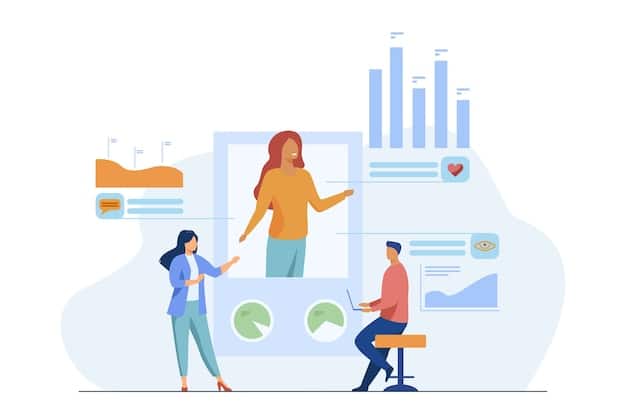AI-Powered HR: Boost Talent Acquisition & Retention in the US

AI-Powered HR is revolutionizing talent acquisition and retention for US companies by automating tasks, enhancing decision-making, and creating personalized experiences, leading to more efficient and effective HR strategies.
In today’s competitive landscape, US companies are constantly seeking innovative ways to enhance their talent acquisition and retention strategies. AI-Powered HR: Optimizing Talent Acquisition and Retention Strategies for US Companies is emerging as a game-changer, offering unprecedented opportunities to streamline processes, improve decision-making, and create a more engaging employee experience.
Understanding AI’s Impact on HR in the US
Artificial intelligence is no longer a futuristic concept; it’s a present-day reality that’s reshaping industries across the board, including human resources. In the US, the adoption of AI in HR is rapidly accelerating, driven by the need to optimize talent management and gain a competitive edge.
Key Applications of AI in HR
AI is being deployed across a wide spectrum of HR functions, from automating routine tasks to providing data-driven insights for strategic decision-making.
- Recruitment and Selection: AI algorithms can analyze resumes, screen candidates, and even conduct initial interviews, significantly reducing the time and resources involved in the hiring process.
- Employee Training and Development: AI-powered platforms can personalize learning experiences, identify skill gaps, and provide targeted training recommendations, leading to improved employee performance and engagement.
- Performance Management: AI can analyze performance data, identify high-potential employees, and provide insights for performance improvement, fostering a culture of continuous growth and development.
- Employee Engagement and Retention: AI-driven tools can monitor employee sentiment, identify potential issues, and provide proactive interventions to improve employee satisfaction and reduce turnover.
The integration of AI into HR processes offers significant benefits for US companies, enabling them to attract, develop, and retain top talent more effectively. As AI technology continues to evolve, its impact on HR will only become more profound.

Optimizing Talent Acquisition with AI
Talent acquisition is a critical function for any US company, and AI is revolutionizing the way organizations attract and hire top talent. From sourcing candidates to streamlining the interview process, AI-powered tools are helping HR professionals make more informed decisions and improve the overall effectiveness of their recruitment efforts.
AI-Powered Sourcing and Screening
AI algorithms can analyze vast amounts of data from various sources, including job boards, social media, and internal databases, to identify potential candidates who meet specific criteria.
These algorithms can also screen resumes and applications, automatically identifying candidates who possess the required skills and experience, significantly reducing the manual effort involved in the screening process.
Enhancing the Interview Process with AI
AI can also be used to enhance the interview process, providing valuable insights into candidate behavior and potential fit with the organization. AI-powered chatbots can conduct initial interviews, asking standardized questions and assessing candidate responses.
- Automated Interview Scheduling: AI can automate the scheduling of interviews, coordinating with both the candidate and the hiring team to find mutually convenient times.
- AI-Driven Interview Analysis: AI algorithms can analyze video interviews, assessing nonverbal cues and language patterns to provide insights into candidate personality and communication skills.
- Bias Reduction: AI can help reduce bias in the interview process by standardizing questions and providing objective assessments of candidate qualifications.
By leveraging AI to optimize talent acquisition, US companies can streamline the hiring process, reduce time-to-hire, and improve the quality of their hires. This, in turn, leads to a more productive and engaged workforce.
AI’s Role in Improving Employee Retention
Retaining top talent is just as important as attracting it, and AI is playing an increasingly significant role in helping US companies improve employee retention. By analyzing employee data and identifying potential issues, AI-powered tools can provide valuable insights for proactive interventions.

Identifying and Addressing Employee Attrition Risks
AI algorithms can analyze various factors, such as employee performance, engagement levels, and feedback, to identify employees who are at risk of leaving the organization.
By identifying these potential attrition risks, HR professionals can take proactive steps to address the underlying issues and improve employee satisfaction.
Personalized Employee Experiences with AI
AI can also be used to create more personalized employee experiences, tailoring benefits, training, and career development opportunities to individual needs and preferences.
- Personalized Learning Paths: AI-powered platforms can recommend customized learning paths based on employee skill gaps and career aspirations.
- Targeted Feedback and Recognition: AI can analyze performance data and provide targeted feedback and recognition, motivating employees and reinforcing positive behaviors.
- Proactive Well-being Support: AI-driven tools can monitor employee sentiment and provide proactive access to well-being resources, such as stress management programs and mental health support.
By leveraging AI to improve employee retention, US companies can reduce turnover costs, maintain a stable workforce, and foster a culture of employee loyalty and commitment.
Navigating the Ethical Considerations of AI in HR
As AI becomes more prevalent in HR, it’s crucial for US companies to address the ethical considerations associated with its use. Bias in algorithms, data privacy concerns, and the potential for job displacement are just some of the challenges that need to be carefully considered.
Addressing Bias in AI Algorithms
AI algorithms are trained on data, and if that data reflects existing biases, the algorithms can perpetuate and even amplify those biases.
To mitigate this risk, it’s essential to ensure that the data used to train AI algorithms is diverse and representative of the workforce. Regular audits of AI algorithms can also help identify and address potential biases.
Protecting Employee Data Privacy
AI-powered HR tools collect and analyze vast amounts of employee data, raising concerns about data privacy and security.
- Data Minimization: Collect only the data that is necessary for the specific purpose.
- Data Anonymization: Anonymize or pseudonymize data whenever possible to protect employee identities.
- Transparent Data Usage: Be transparent with employees about how their data is being used and provide them with the opportunity to access and correct their data.
By prioritizing ethical considerations, US companies can ensure that AI is used in a responsible and equitable manner, fostering trust and promoting a positive employee experience.
The Future of AI in HR for US Companies
The future of AI in HR is bright, with even more innovative applications on the horizon. As AI technology continues to advance, we can expect to see even greater automation, personalization, and data-driven insights in the field of human resources.
Emerging Trends in AI-Powered HR
Several emerging trends are shaping the future of AI in HR, including the use of natural language processing (NLP) for sentiment analysis, the integration of AI with virtual reality (VR) for training, and the development of AI-powered coaching platforms.
Preparing for the AI-Driven HR Transformation
To prepare for the AI-driven HR transformation, US companies need to invest in training and development programs to equip their HR professionals with the skills and knowledge they need to effectively use AI-powered tools.
- Upskilling HR Professionals: Provide training on data analysis, AI algorithms, and ethical considerations.
- Developing Data Literacy: Foster a culture of data literacy throughout the HR organization.
- Embracing Collaboration: Encourage collaboration between HR professionals and data scientists to develop and implement AI-powered solutions.
By embracing AI and preparing for the future, US companies can unlock the full potential of AI-Powered HR and gain a significant competitive advantage in the talent market.
Implementing AI in Your HR Strategy
Implementing AI in your HR strategy is a significant undertaking that requires careful planning and execution. However, the potential benefits are well worth the effort.
Key Considerations for AI Implementation
Before implementing AI in your HR strategy, it’s important to consider several key factors, including your business objectives, your data infrastructure, and your organizational culture.
Steps to Successful AI Implementation
To ensure a successful AI implementation, follow these steps:
- Define your business objectives and identify the HR challenges that AI can help address.
- Assess your data infrastructure and ensure that you have access to the data you need to train AI algorithms.
- Choose the right AI-powered tools and platforms for your specific needs.
- Pilot test AI solutions before deploying them across the organization.
- Monitor the performance of AI solutions and make adjustments as needed.
By following these steps, you can successfully implement AI in your HR strategy and reap the many benefits that it has to offer. Embracing AI-Powered HR helps US companies to make more informed, data-driven decisions, leading to improved employee satisfaction, reduced turnover, and a more engaged and productive workforce.
| Key Point | Brief Description |
|---|---|
| 🤖 AI in Recruitment | Automates sourcing, screening, and initial interviews to streamline hiring. |
| 📈 Performance Management | Provides data-driven insights for performance improvement and identifies high-potential employees. |
| ❤️ Employee Retention | Predicts attrition risks and personalizes employee experiences to boost retention. |
| 🛡️ Ethical Considerations | Addresses bias, data privacy, and job displacement concerns to ensure responsible AI use. |
Frequently Asked Questions
▼
AI automates sourcing, screens resumes, and conducts initial interviews, reducing time-to-hire and improving the quality of hires by quickly identifying candidates who are best suited for the position.
▼
Yes, AI-powered platforms analyze skill gaps and recommend customized learning paths, enhancing employee performance and engagement through tailored training content that addresses specific needs.
▼
AI identifies at-risk employees by analyzing performance and engagement data. It helps HR proactively address issues through personalized experiences and well-being resources, fostering loyalty and reducing turnover.
▼
Companies should prioritize diverse training data, conduct algorithm audits, protect data privacy, and maintain transparent data usage policies. This ensures fairness, trust, and responsible AI implementation in HR processes.
▼
Expect increased NLP for sentiment analysis, AI integration with VR for training, and AI-powered coaching platforms to enhance personalization and insight. Businesses need to invest in HR skill development for these integrations.
Conclusion
AI-Powered HR is revolutionizing talent acquisition and retention strategies for US companies. By automating tasks, enhancing decision-making, and creating personalized experiences, AI enables HR professionals to attract, develop, and retain top talent more effectively, leading to a more engaged and productive workforce.





